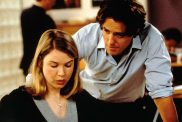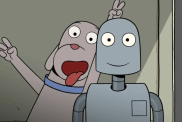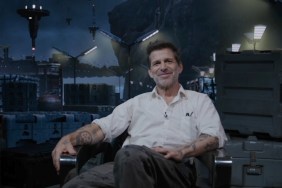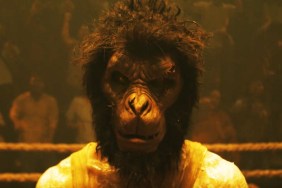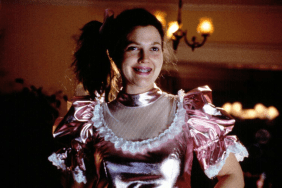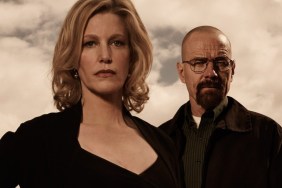Born and raised in Hong Kong but a resident of the United States since he was 17, Wayne Wang ended up being the perfect director to helm an adaptation of Amy Tan’s beloved novel The Joy Luck Club in 1993. Ten years later, Wang would become one of Hollywood’s most sought after studio directors after high-profile comedies like Jennifer Lopez’s Maid in Manhattan and Last Holiday starring Queen Latifah, as well as the family film Because of Winn-Dixie, all surprising choices for the filmmaker behind the racy and controversial indie The Center of the World.
Now Wang is back to doing smaller indie films that deal with issues faced by Chinese-Americans, much like his earlier films. A Thousand Years of Good Prayers, an adaptation of the short story by Yiyun Li, is the story of Mr. Shi (Henry O.), an aging Chinese widower reunited with his recently-divorced 40-year-old daughter (Faye Yu) in a small suburban community in the United States, though the two of them find it hard to reconnect as they both try to escape from their past. It’s a quiet character piece like the films of Tom McCarthy (The Visitor, The Station Agent) that explores issues that all parents with older children face, with the cultural differences between the two characters bringing another level of emotion to Ms. Li’s delightfully sublime story.
ComingSoon.net spoke with Mr. Wang a few months back before the movie’s release was moved back to this coming weekend, and since then, it was announced that Wang’s companion piece Princess of Nebraska, also based on a Yiyun Li short story, would have its premiere on YouTube a month later.
ComingSoon.net: This film is an interesting departure for you, but also somewhat of a return. You’ve been making studio movies in Hollywood in recent years, so was it a conscious thing that you wanted to go back to doing smaller indies like this?
Wayne Wang: I got on this treadmill of studio movies and I had fun, made a lot of good money, but I was having a hard time getting off of it so I sort of consciously just got off and said, “How can I go back to some of my own films, independent films dealing with the Chinese in America again?” I found first of all one of the big changes with the Chinese community here is that there are a lot more new immigrants from China, and second, I found Yiyun Lee’s book “A Thousand Years of Good Prayers.” There were two stories that I really liked in there, so I ended up doing “A Thousand Years” first. Even as I was doing that one, I kept obsessing about the other one because they’re kind of addictive so to speak because in the first one the woman is in her forties and sort of was indirectly affected by the Cultural Revolution and in a way she’s trying to run away from her past, and like she says, “Learn a new language, culture, and become more American.” This new one grew up during the economic boom and has no idea about all the history really, because if you ask these young kids in China about the Tang Man, they don’t even know that image. In an odd way she’s trying to find herself, to find her own identity in her past, so those two together I find really interesting, so I end up making two films.
CS: You’ve probably spent equal time making movies in America and Hong Kong, so do you favor working in one place or another at this point?
Wang: I spend more time in America than Hong Kong, but I do go back there to China on and off.
CS: Were you able to relate to either of these characters or both of them?
Wang: I relate to both of these two characters actually. I relate mostly to Yilan in “A Thousand Years” because she’s closest to me so to speak. The new generation of Chinese, they’re really out there (laughs)… I mean, they’re a whole other animal so to speak. Ted Koppel has a four-night series on China which should be very interesting, but I was reading some of the things that he was finding that these younger people are pretty much not only ignorant of their past, but really only interested in making money. The Horatio Alger phenomenon exists there completely.
CS: Have you thought about doing another movie back there, since it’s been so long since you made a movie in Hong Kong?
Wang: I have thought about doing something that deals with Taiwan, Hong Kong, and China because I know all those three places and the relationship between those three places is fascinating, so I’m considering something like that.
CS: Some of your filmmaking peers from Hong Kong, the directors in your age group, have been making big historic war epics of there, so is that something you’re attracted to as well?
Wang: (laughs) I’m not a big epic person, you know? I’m more of the small personal movie man. I like to tell the small personal stories rather than the big epic movies. I find the big epic movies kind of boring. People like Hou Hsiao-Hsien, Edward Yang, Zhang Yimou when he made the more personal movies were the films that I liked.

CS: How about going back to a smaller budget movie after doing this? Did you find any limitations?
Wang: Well, there are obvious limitations because when I did “Maid in Manhattan” shooting at the Waldorf, I could probably have asked for a pink elephant and it would’ve arrived in ten minutes literally (laughs), but with a small budget movie you don’t have anything. I don’t have an assistant. You just kind of make do with what you have, but at the same time you are free from a lot of things. Like for example, even though I had a very tight script, I kept changing the script, I changed what I shot, I worked very organically. On a big studio movie you would have to then talk to the producer, the producer has to talk to the studio, the studio has to call you, sometimes they say yes, sometimes they say no, sometimes they say shoot both, but you can’t do anything without getting an okay.
CS: How about working with Yiyun? When you read her stories, had you met her at that point?
Wang: I met her a few times and she’s very bright. I gave her Final Draft and I walked through with her what I liked, what I didn’t like, what’s not there, and what’s needed for a screenplay based on her short story. She just went off and wrote and I looked at the first draft and we worked on it some more. We did three or four drafts at least.
CS: Did she adapt the other short story of hers into a screenplay as well?
Wang: No, the other one was adapted by Michael Ray who is the editor for Francis Ford Coppola’s magazine “All Story” and he’s a very bright writer also because that one I wanted to kind of take off a little bit more from the original story. The first one was quite faithful. The second one, we wanted to take the essence of it and improvise more.
CS: You worked with Faye Yu in “The Joy Luck Club” but Henry O was someone new to your way of working, so what was your process for finding the right actors to play these characters?
Wang: It was really difficult finding those two key actors because they both have to speak perfect Beijing dialect which is very specific. Unless you’re kind of from there, it’s pretty hard. One of them had to speak broken English, the father, and then one of them had to speak pretty good American English. And to get that combination was not easy to cast. Somebody recommended Henry, I met with him and I saw how diligent he was in creating a broken English for his character that’s stereotyped, it’s very specific, and I like his own background and what he’d gone through himself in the cultural revolution and stuff like that. Fei I worked with on “The Joy Luck Club,” but she didn’t speak any English at that time, but I had heard from my assistant director that she lived in L.A. for three or four years at some point to study English, so I called her on the phone and she spoke to me in English and sounded great, so I said, “That’s the person for me.” So I ended up with Fei and Henry, but it was not easy it took a long time trying to find those two people.
CS: Did you try to get them together for auditions or screen tests to make sure they’d work together?
Wang: I never could put them in the room together until we shot because Fei lives in Beijing, and Henry O lives in Bellevue in Washington state where Microsoft is.
CS: That’s kind of ironic that the actor playing the more American of the two characters actually lives China.
Wang: That’s right, it’s the other way around.
CS: That’s surprising, since I just assumed Henry was an actor you found in China.
Wang: He has an immense history of experience. Everything from “The Sopranos,” to “West Wing,” to the teacher of “The Last Emperor” with Peter O’Toole, Jackie Chan’s father, Jet Li’s father, he’s been everyone’s father, but never really in a meaty, good role. These days especially, who’s going to cast a 70 year old man in a main role? So that’s why I felt so driven to make this story about this character.
CS: Did you end shooting the entire movie on location?
Wang: It was all locations, finding the right locations. The apartment that she lives in was the key location. We looked at five hundred of those and they’re all the same by the way. They even have a name for them, called 10-60. Basically a two bedroom apartment is a 1060 because that’s the square footage and they’re all laid out the same. There’s subtle differences that make decisions for us like seeing the swimming pool, there’s a little bit more of one wall that I could use as that separation wall towards the end when he’s doing his confession. So it was like looking at all these apartments, they’re exactly the same, and then finding the one for us. I loved the idea because if you see the wide shots it’s like a whole village, but what’s really interesting is that nobody really has much contact with each other. They live in this complex, but there’s really no community.

CS: Oh, I can understand that. When you found this location, did you have to map out where you wanted to shoot everything to make it work?
Wang: We mapped it out pretty good, but we still made changes, but the mapping out helped us sort of define what the parameters are, things that we were interested in, and stuff like that.
CS: Were you able to bring anything from your studio movie experience to this?
Wang: (laughs) Well… Mostly trying to forget all that stuff, mostly trying to work simpler. Because the Hollywood system is really about efficiency, speed, and control, whereas here you kind of sacrifice those things for the sake of maybe more of a genuine, organic way of working. So you kind of throw away all that stuff and just take your time, work with a smaller crew, and try to find something that’s a little more authentic.
CS: I was never really able to figure out was how much time actually passes in the story. Was that something that was clearer in the short story or was it always supposed to be sort of vague?
Wang: I think it’s only like four days and four nights, something like that. Not that long and in the movie, every dinner marks the end of another day.
CS: I wasn’t sure about that, because it could have literally been months without realizing it. Did you end the movie where the original story ended?
Wang: The original story ended differently. The original story ended with a scene between the Iranian woman and him and they both sort of have a sense of regret for how the world is changing and they have a communication with each other. That’s how the original story ended. I wanted to change that because in the end the world is a little harsher than that actually.
CS: In your movie you mean?
Wang: Yeah.
CS: What about this other movie you made based on her work? Is this something that’s going to be released as well?
Wang: “The Princess of Nebraska”? Well, it’s always been thought of–but I don’t quite know how they’re going to do it yet–but a parallel platform because they are related films. They are thematically related in an interesting way, like I said, one woman trying to forget her past, and one woman trying to find her identity so to speak. Parallel platforms. One may go straight onto the internet at the same time the other is released in the theater. So they will then be also presented as a related brother and sister film. I think it’s really interesting, the fact that one goes on the internet and you can see it after you see this other film and vice versa. In France, they’re going to release the two films together in the multiplex on separate screens, so you can see one, or the other, or see both.
CS: Both movies were at Toronto last year, right?
Wang: Yes, and in Toronto they showed them back to back as one feature.
CS: Was it hard getting these movies made?
Wang: It was a hard movie to get made, when you think about it. It’s a movie again, about an old man, it’s in subtitles, not much happens in the movie, so it was not an easy pitch to get the money to do it. Originally also, half the financing was coming from China. That dropped out at the last minute because they wanted some censorship such as the line, “Communism is not bad, it just fell into the wrong hands,” stuff like that. So it was really difficult.
CS: It’s really amazing how many amazing films come out of China, since there’s so much censorship.
Wang: They somehow get made and a lot of times there’s a different version circulating outside of China and the Chinese one is actually a different ending and not so edited, or whatever. I just met with the director who did this movie called “Iron Mountain” and he had to do one ending for the festivals and the outside market, and another really nice ending for China.

CS: Did you shoot this one first?
Wang: I shot “A Thousand Years” first, but all the way through “A Thousand Years” I was kind of obsessed because there were a lot of younger women from China working on the film and I went, “Boy, they’re really interesting. I’ve got to make “Princess of Nebraska.” So by the end of editing, I had some money left from that budget oddly enough, so what can I do? “Princess of Nebraska.” Which is how “Smoke” and “Blue in the Face” also happened.
CS: So when you go back to studio movies, you should ask for bigger budgets and then have some money left over to make more of these.
Wang: They will never let me do another film (with the money) though, no. Harvey Weinstein at least is kind of open to that idea, but with studios, even if you have money left over, they go, “Oh, we have to save it for post or marketing. We won’t let you do another movie.”
CS: What have you been doing since finishing these two movies, which must have been nine months ago now? Are you developing all of your own projects these days?
Wang: I’m developing my own projects so there’s like three or four things going on at the same time, but I’ve been really busy trying to get these two films out. One of the big differences between again the studio films and the independent, the independent you have to spend years pushing these films going to festivals. I just came back from Europe doing press for the films, I was in San Sebastian where the film won the award. I’ve just been traveling a lot trying to really set up these movies.
CS: So are you looking at things you might want to do next?
Wang: There’s different things. There’s a script that a friend of mine, a young novelist wrote about Hawaii that I’m interested in, there’s a book I’m interested in called “A Concise Chinese English Dictionary for Lovers” by a young Chinese woman also living in London, a very interesting book. So they’re different projects I’m kind of interested in.
CS: Do you have a regular producer who you usually work with?
Wang: I have different producers depending on what it is. I have European producers for things that are financed out of there, I have a good friend who works in a studio system, I have local Asian people that I work with for Asian related projects, so different things for different purposes.
CS: What about Yiyun and her screenwriting? Do you think you might do more with her?
Wang: I’ve been encouraging her, but she’s trying to finish up her big novel. This is her first big novel so she’s really focusing her energy on that, and that’s coming out next year actually.
CS: Do you get the automatic first look?
Wang: (laughs) I hope so, but I’ve been encouraging her to write a script. She has some really wonderful ideas and once she’s finished with the book, I want to get her doing that again.
CS: At one point you were going to do a movie with Happy Madison, so is that something you might still do?
Wang: I don’t know why that ended up on my IMDb. Everybody likes the idea of maybe me doing something with Happy Madison and Adam Sandler, but I was in love with a wonderful idea and a script about Adam Sandler waking one night after a big party in Chinatown and he realizes he’s married to someone. It was him and Zhang Ziyi.
CS: That would probably be the perfect mix of the two things you’ve done over the course of your career.
Wang: That’s true. I should call back Adam and say, “Hey, we’ve got to do something like this.” He was really excited about it at the time, but the script never kind of came together.
CS: I’ll try to put this “Good Cook” thing to rest then, because I know it’s been circulating for some time.
Wang: (laughs) It’s not happening, yeah.
A Thousand Years of Good Prayers opens at the Lincoln Plaza Cinemas in New York on Friday, September 19 with plans to roll into other theaters in the coming weeks. You can watch its thematic counterpart The Princess of Nebraska on YouTube starting on October 17.

